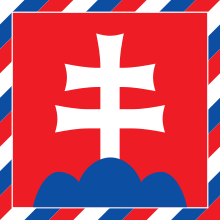President of Slovakia

The President of Slovakia is the head of state of his country. He is directly elected by the people. The incumbent has been Zuzana Čaputová since June 15, 2019 . She prevailed against Maroš Šefčovič in a runoff election on March 30, 2019 and is the country's first female head of state.
The Slovak Republic has a parliamentary system of government . The President represents the state externally in accordance with Article 102 of the Slovak Constitution . He belongs to the executive branch within the Slovak political system .
Election mode
The president has been elected by the people in direct elections since 1999; before that, the National Council elected him with a three-fifths majority of all MPs. The candidate who receives an absolute majority of the votes in the first ballot is elected President. If no candidate has the required number of votes in the first ballot, a second ballot takes place in which the two candidates who received the most votes in the first ballot participate. A simple majority is sufficient in this ballot. The electoral term is five years, re-election is possible once.
The National Council of the Slovak Republic can initiate a voting procedure for the president, which consists of a referendum, with a three-fifths majority of all MPs. If the people confirm the president in this, the mistrust is automatically expressed in the National Council and it is dissolved.
Powers and rights of the President
In accordance with Rule 102 i. V. m. Article 110 independently the Prime Minister and then the Minister in agreement with him. According to the constitution, he negotiates and ratifies international treaties, but he can also delegate these powers to the government. In certain crisis situations he can dissolve the National Council. In the legislative process he signs laws and has a suspensive veto . In this way, he can send a draft law back to the National Council (if necessary with proposed amendments) (this does not apply in the case of a constitutional law). He appoints the judges of the Constitutional Court ( Ústavný súd Slovenskej republiky ) and the Attorney General. He is also the chief commander of the armed forces. He has the right to mitigate or cancel penalties and can issue amnesties.
The President cannot be prosecuted. He can only be charged with deliberate breach of the constitution or high treason before the Constitutional Court and on indictment by the National Council. The only possible penalty is loss of office and loss of fitness.
Public officials
Those politicians are listed with a "K." who temporarily held the office of President of the Republic for the period indicated.
| No. | image | Surname | Term of office | Political party |
|---|---|---|---|---|
| K. | Vladimír Mečiar |
January 1, 1993 - March 2, 1993 |
HZDS | |
| 1. |

|
Michal Kováč (* 1930; † 2016) |
March 2, 1993 - March 2, 1998 |
nominated by HZDS |
| K. |
Vladimír Mečiar from July 14th with Ivan Gašparovič |
March 2, 1998 - October 30, 1998 |
HZDS | |
| K. |
Mikuláš Dzurinda with Jozef Migaš |
October 30, 1998 - June 15, 1999 |
SDK | |
| 2. |

|
Rudolf Schuster (* 1934) |
June 15, 1999 - June 15, 2004 |
nominated by SOP |
| 3. |

|
Ivan Gašparovič (* 1941) |
June 15, 2004 - June 15, 2014 |
nominated by HZD |
| 4th |

|
Andrej Kiska (* 1963) |
June 15, 2014 - June 15, 2019 | independent |
| 5. |

|
Zuzana Čaputová (* 1973) |
June 15, 2019 - acting |
Progresívne Slovensko |
elections
- 1999 presidential election in Slovakia
- 2004 presidential election in Slovakia
- Presidential election in Slovakia 2009
- Presidential election in Slovakia 2014
- Presidential election in Slovakia 2019

